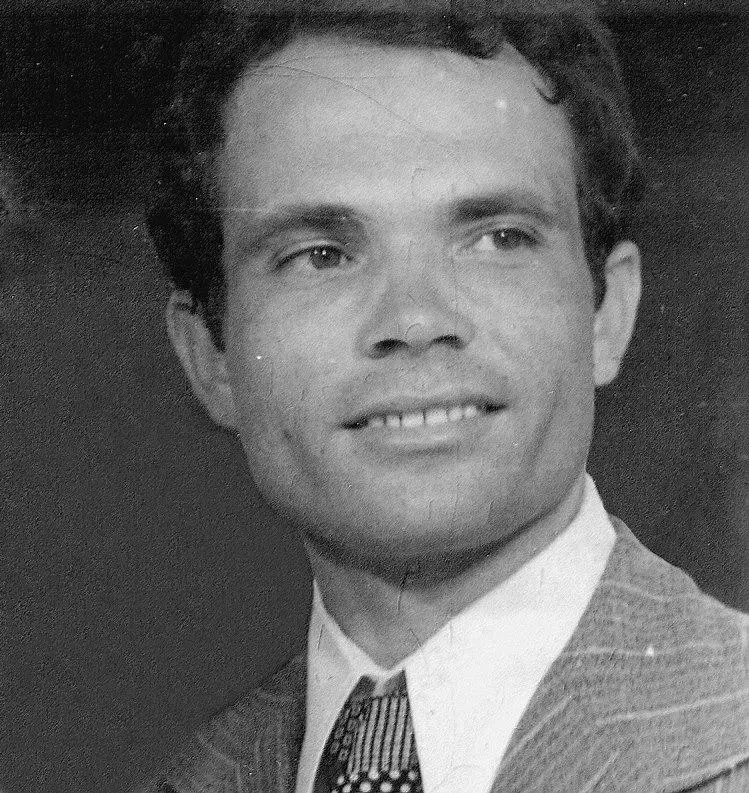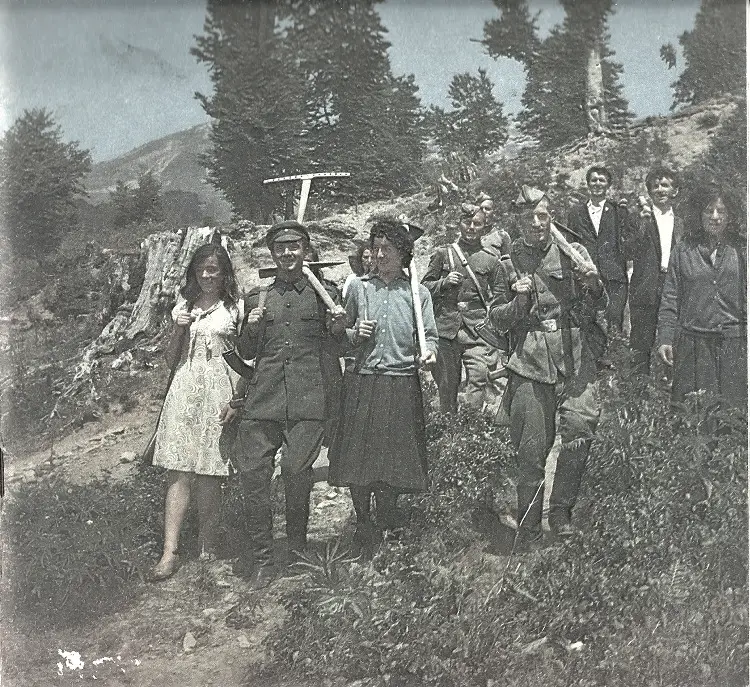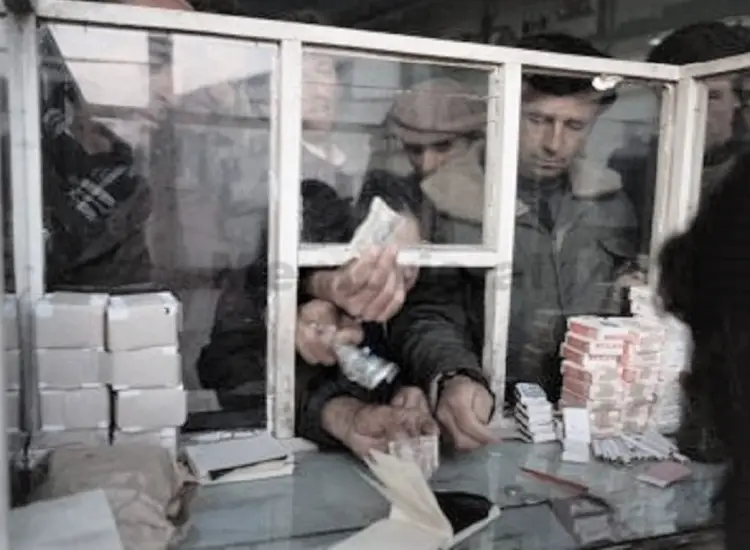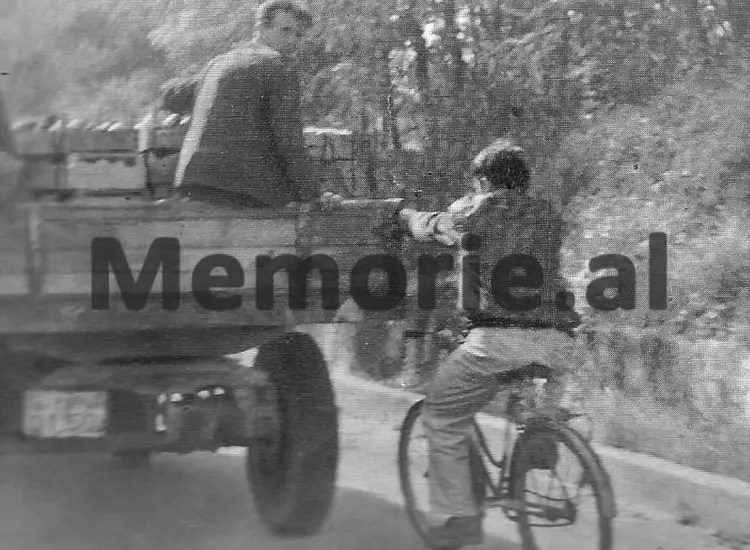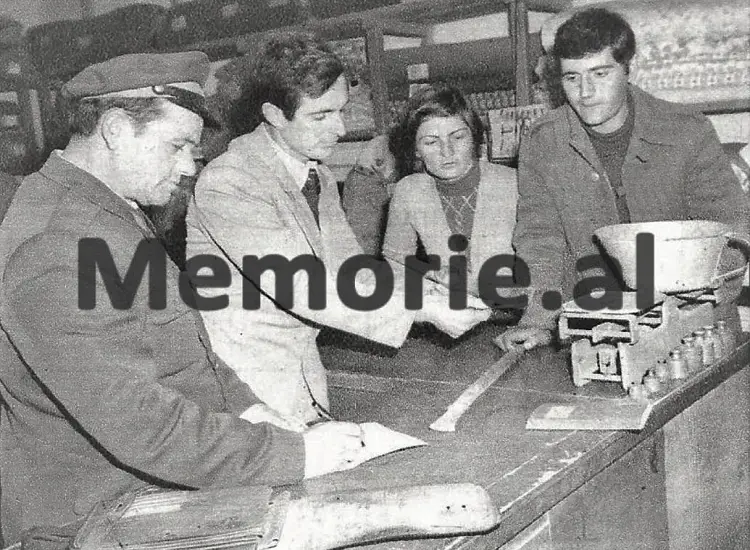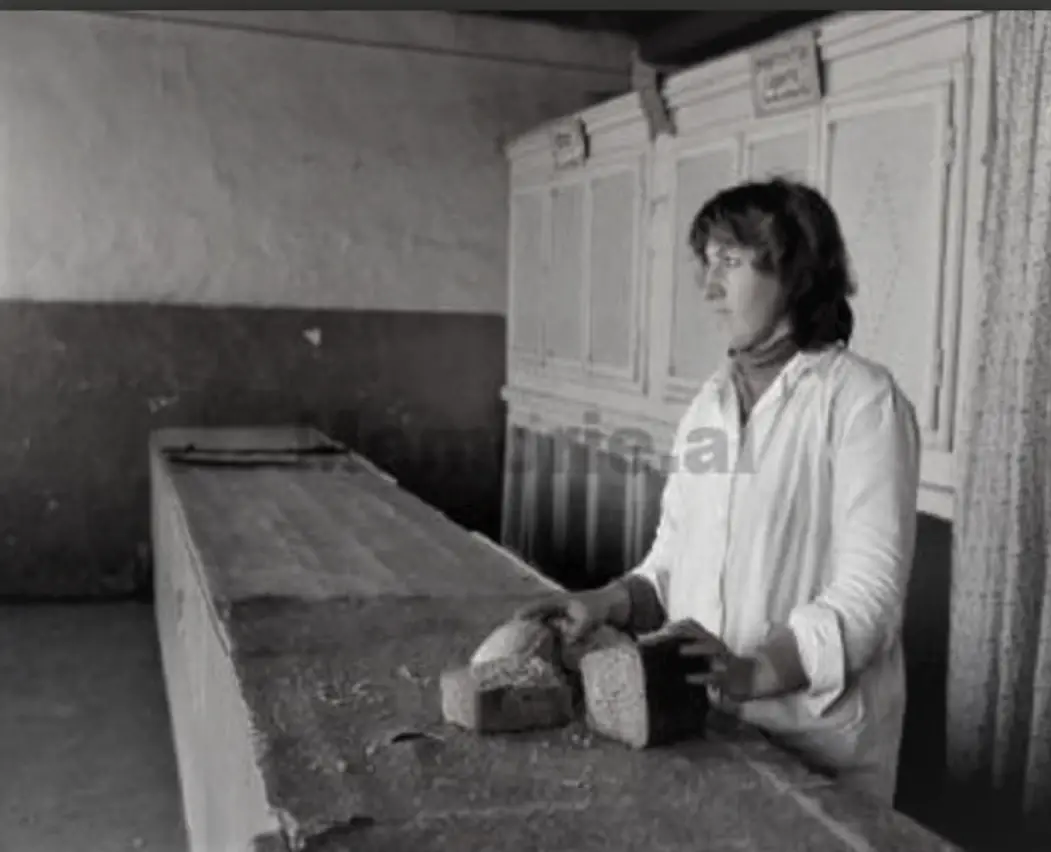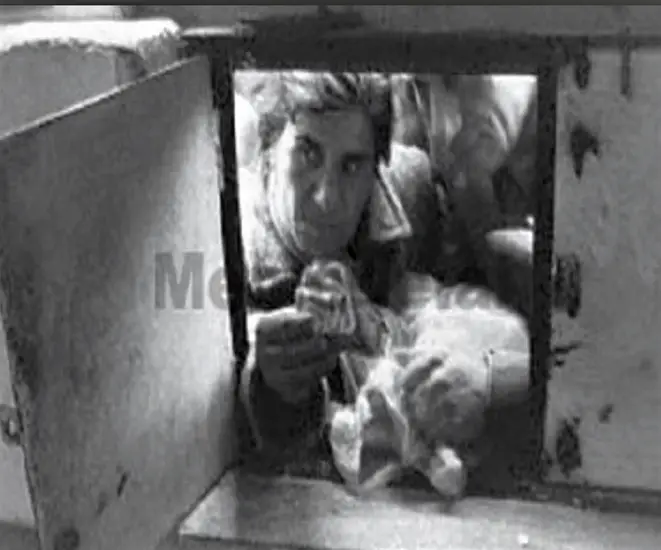By Vasil Qesari
The sixth part
Memorie.al/The overthrow of the great totalitarian edifice in Albania would leave behind, not only the change of the system, accompanied by a lot of hopes, mirages and cries of happiness, but, unfortunately, also a lot of wounds, drama, victims, dust, milk and whatnot lies of all kinds. Ten years and more after that event, which deeply shook society, completely overturning many previous codes, rules and concepts, people still continue to ask themselves such questions as: What really happened in society Albanian, during the last 50 years of the dictatorship? How was it possible that the system managed to warp everything? Why did people accept it? What was the totalitarian logic of the transformation of society and the individual? How were the structures of totalitarian mechanisms conceived and functioning: propaganda, secret police and the exercise of the ideology of terror? How did it happen that among all the communist countries of Eastern Europe, Albania was considered an exception or a special case? Why did Enver Hoxha remain blindly, fanatically loyal to Stalin until the end, turning the country into a prison where violence, fear and purges continued until the end of the 80s? Why was the country so insanely isolated, locking people up between bunkers and barbed wire? Why, then, did all the above phenomena happen…?! The book “Post-scriptum for Dictatorship” does not claim to provide definitive answers to the above questions, or the complexity of the reasons that brought and maintained the totalitarian power in Albania. Nor is it a complete, deep and comprehensive fresco of the life and suffering that people experienced during that system. Its author, perhaps, has the merit that together with the retrospective view of the totalitarian period as well as the zeal of a passionate analyst, he has tried to turn his head back once again, to give not only his personal memories and opinions, but also to return once again to the vision of that era with the simple philosophy of preserving the Memory and supporting the Appeal to never forget the well-known maxim, that…the corpse’s nails and hair continue to grow even after death! Ten years or more after the great revolution, the book in question has current value and we hope it will be appreciated by the reader because, as an Albanian researcher also says… the greatest evil that can happen to a people comes when he fails to analyze his own past. An amnesic people are forced to be constantly neuropathic and repeat their painful experiences…!
Continues from last issue
“The most valuable capital man”!
Man is the most precious capital! “You can read this slogan in many corners of Tirana. Of course, in the main square of the Albanian capital, it is difficult to see the poverty of the people up close. You don’t come across children begging or looking for chewing gum, young people who try to secretly buy blue-denim pants, which usually happens in other countries of the East, etc…! No, there are no such things here! Only people on Chinese bicycles pass by, men and women wearing alike; with the same trousers and shirts, or young girls wearing skirts of the same length above the knees, as if someone had cut them all at once with scissors. We cannot go further than the Main Square and boulevard, where we can really meet poverty. This thing is forbidden because, we have come as tourists to a prosperous country where, as friend Enver says “even the cows are more beautiful than you…”!
How do those people live in such poverty? How long are they still alive and not starved to death? How lucky we were to be born and live in a prosperous country like ours…! So, long live the Party, which has provided us with everything! Bread for the mouth, electric light, schools for children…! Of course, the totalitarian propaganda had done its work for years and very successfully, and the ‘Collective Popular Mind’, completely stunned by the euphoria of Imaginary Happiness, could not understand that it was they, and not others, who lived in misery and complete poverty. But, many of those who belonged to the old generation, who had lived in the previous regime, managed to do the calculations well.
But the chronic lack of food was only part of the Evil. Albanian life had many other sufferings. The construction of socialism, fully relying on its own forces, as well as that endless and eternal campaign to save whenever and in everything, had impoverished to the extreme not only people’s lives, but above all, their souls. At every moment and from every side, the poor individual, whenever and wherever he was, received without interruption the same messages: Saving should become a way of life for anyone and everywhere…! At home, in everyday life, at work…! Save electricity, water, coal…! Save spare parts, imported materials, fuel, coal…! Every drop of oil is gold…! To encourage initiatives for the use of animals and the replacement of machines by means of them…etc.
But these were not the only ones!
Among the other ordeals of the Albanians, there was also the issue of housing the urban population. At that time, in propaganda, that problem was ignored and, when talking about the superiority of the socialist system, the bragging about low rents was never forgotten. But what rent was it about? For what housing…? Maybe, first, it would be better to ask the question: Could an Albanian citizen have a 100 m2 apartment, like an average citizen in the West…?! Because, in reality, the living area per capita in Albania did not exceed 9 m2. Yes, was it normal for, for example, a couple with a child to live in 27 m2? Of course, for the Albanian of that time, the problem did not lie in the size of the apartments, but simply in the possibility of putting your head somewhere. Meanwhile, if someone managed to secure those 27 m2, then he had reached the peak of happiness! For a newly married couple, the dream of having a room and a kitchen was the biggest in life.
But the odyssey for renting an apartment from the state, which was infinitely long, complicated, and its outcome depended not more on the urgency of the strait, than on fees, interventions, bribes, family and political origins. Without them, the chances were very few and, no wonder, you would remain homeless forever. In such circumstances, newly married couples were forced to live in the same apartments as their parents. Imagine! What life could be lived in two rooms and a kitchen like an oven, where 6-8 or even 10-12 people lived?! (It was then that the Albanians started to do what was not done in any other European country. They turned their toilets into cooking areas and kitchens into bedrooms).
…Furthermore, Albanians were also used to wearing scanty clothing. Always uniform and dark. For decades, they were produced without ever changing the material, patterns or colors. The good quality and somewhat aesthetic products were intended only for jubilee propagandistic exhibitions. A part that managed to be put on the market was so rare and sought after that it could only be secured with a friend. (Thus, new models of shoes produced in the factories of Korça or Gjirokastra never reached the stores. They were always sold by the managers, merceologists and storekeepers of commercial stores). But the production of clothing and new models had to do with something else. In the communist culture and morality, the discussion and evaluation of tastes, clothing and external aesthetic appearance was not only disliked, but considered taboo and frowned upon. According to her, it was a topic that did not belong in the world of interests of the young man, who had other, much more important preoccupations and duties.
Educated with the teachings of the Party, the young man had to devote himself only to work, to production, to tempering his revolutionary formation. For him, self-care and self-esteem, clothing, appearance, was alien and selfish phenomena. Bright colors, provocative patterns, ornaments, the desire to dress differently from others – all these were unnecessary and harmful to his morals. For the system, this kind of logic was more than natural. Because for him, individuality, changeability, and differences were among the biggest enemies. In a word, the basics of individual freedom…!
The rare release of widely used items was a constant event. So, for example, when what were called at that time: Gjirokastra shoes, Pogradec shoes or Korça flower socks were on sale in the shops, the news would spread many days in advance. People called each other, stood in long lines, pushed, cursed and sweated to be able to buy even one pair.
But, the situation was more complicated, especially for young women and women, who could not provide their own underwear, because they were always few and rare. As for items such as liners or other intimate products, they did not even exist or, more precisely, were not known at all. Most of the women were forced to make them themselves, with artisan methods and tools.
Facial soap was the only cosmetic luxury. However, it was always the same type and was produced in retail, only in the Vlora factory (often, with expired fats and essences). On the other hand, the vast majority of Albanians continued to bathe in a very primitive way. (With some kerosene showers, very original and produced according to a special Albanian “patent”. Showers, which became particularly fashionable during the 70s, produced smoke, soot rather than warm water and very heavy smell). Whereas, the creams for women as well as the toothpaste produced by Profarma in Tirana, which were not remembered for years, were the same. Only two types: Gold and Star. Of course, the men’s toilet was out of the question. For them, shaving with Astra razors and razors manufactured at the Dajti factory, with which you had to have elephant skin to escape without bleeding, continued for decades. (In what other European country would a razor, luxury soap or a pen, be extremely precious and enviable gifts?). And, to finish, let’s add two words: compressed shaving foam was, of course, unknown, while cologne was rarely used. Usually, in marriages or in cases of death. To perfume the corpses and coffins of the dead…!
Suicide initiatives of hunger!
Even to this day, I cannot forget the extreme poverty of the residents of Backa i Skrapari where, during the years 1970-73, I worked as a teacher. The village stood at the foot of the peak of Ostrovica, at an altitude of about 1,800 meters, and the winter was very harsh. The Bacallians, since time immemorial, were excellent cattle breeders. The products of their herds of sheep, such as milk, cheese, butter and wool, were famous not only in the market of Korça, but also further afield. That time, now, was too distant to remember. Because difficult days had come and now it was only about survival. So, just to make ends meet.
Opposite our 8-year old school was the village store. Often, to pass the time, I sat on a wooden bench near his gate. I watched people coming in and out. From beyond, from the few plots where only a short, barren corn was cultivated, at lunch time, many cooperatives would come there. Even today, as I write these lines, my body shudders when I remember that what they came to buy was nothing but a paper ball with sugar, which they then dissolved with water in plastic bowls, making it smooth with corn bread. It was also their lunch…!
For those poor creatures, which once grew up among stables, herds of cattle and meadows full of flowers of Ostrovica, milk and its products were forgotten privileges. Livestock was no longer their property, but of the agricultural cooperative. Or, more precisely, of the state. Well, they were condemned to live with little bread, sugar and water. In the midst of hunger and appalling poverty…! Ten years later, from 1982, I was in a southern area of the country. I was traveling from Kuçi to Vlora. On the way, the bus stopped for a short break, in front of the Brataj village club. Many passengers got off to drink water and some coffee. I lit a cigarette and went to the ‘Miscellaneous Items’ store. A large crowd of people pushed, cursed and made noise inside and outside it. I asked a villager what was on sale. The supply of oil and margarine has arrived, as well as the ration of eggs – he said.
Queue for margarine in the villages of the River Vlora?! Oh god, this was crazy…! And where…? In a country with traditions in animal husbandry? No, this was really, the climax…! Indeed, in 1982, the madness of the regime reached its peak. With a series of orientations, ordinances and initiatives, the state had deprived him the Albanian peasant from any type of minimal property. In addition to the herding of small and large cattle, as well as the final removal of personal gardens, he had decided that the peasant would no longer keep even birds and chickens! Throughout the country, these suicidal revolutionary initiatives deepened the existing crisis and further and, consequently, the consequences of the famine were even greater.
Not only in the district of Vlora, for which I gave the above example, but in all of Albania, meat, eggs, milk, cheese, butter and curd, all livestock products in general, became more and more rare. The scarce milk went directly to the dairy. Then, from there, livestock products were withdrawn from state commercial enterprises, dissolved like salt in water. In the years that followed, the severe economic crisis and the destructive experiment of herding individual livestock, ultimately led the supply of the people to disaster.
Such a state of national hunger and, at the same time, a crime against the people, also lay in the fact that a good part of the agricultural and livestock products, due to the country’s demands for currency, went towards export. The bulk construction of solar greenhouses and those with a heating system took obvious advantage. Everywhere, large banners were seen, with the words Export breaks the blockade. Profits were significant, especially from the tomato crop, but also from cucumbers, mullets, etc. From the first days of May, which also marked the beginning of the early production season, the work became very intense.
In the packaging hangars, work continued without interruption, until late at night. In front of them, large TIR trucks were lined up and waiting one after the other, which then, after being loaded with thousands of crates of tomatoes with Albanischen Erzeugnis labels, headed for Italy, Austria, Germany, Hungary and other countries.
Meanwhile, very small quantities of tomatoes were brought to the domestic market. Of course, with fantastic and out-of-the-ordinary prices. Even the first products from the field, such as early potatoes, peppers, watermelons, leeks, peppers, etc. were intended for export. 1982, the madness of the regime reached its peak. With a series of orientations, ordinances and initiatives, the state had deprived the Albanian peasant of any type of minimal property. In addition to the herding of small and large cattle, as well as the final removal of personal gardens, he had decided that the peasant would no longer keep even birds and chickens (?). Throughout the country, these suicidal revolutionary initiatives deepened the existing crisis and further and, consequently, the consequences of the famine were even greater. On the eve of the Orthodox Easter, in the streets and squares in front of the sea port, at the Wharf of Vlora, rows of trucks loaded with kids and lambs were waiting for their turn to load the goods on transport ships bound for Greece. The same thing happened in the fishing enterprise, which brought significant quantities of fish every week to Brindisi, Italy.
On the other hand, the cannery combine worked almost entirely for export as well as the forest enterprise, which exported pheasants, frogs, snails, etc. In fact, the extreme poverty in the country began to worsen, especially after the break with the Chinese. With the termination of its loans and aid, the rationing of food products became even more restrictive. Even after the sensational victory of bread production in the country, (most recently, the notebooks of bread shops, the lists with names and the long, daily queues were abandoned), the great troubles for the Albanians were not over.
According to them, it caused serious heart disease and therefore, it had to be replaced with chicory coffee or mountain tea. In that campaign, the organization of the Democratic Front was especially mobilized, which, in meetings with the people, took initiatives to give up the customs of the peasants, not to use coffee and brandy, and to limit exaggerated spending, such as on occasions of joy. as well as in sorrows. On the eve of the Orthodox Easter, in the streets and squares in front of the sea port, at the Wharf of Vlora, rows of trucks loaded with kids and lambs were waiting for their turn to load the goods on transport ships bound for Greece. The same thing happened in the fishing enterprise, which brought significant quantities of fish every week to Brindisi, Italy. On the other hand, the Cannery Factory worked almost entirely for export, as well as the forestry enterprise, which exported pheasants, frogs, snails, etc. In fact, the extreme poverty in the country began to worsen, especially after the break with the Chinese. With the termination of its loans and aid, the rationing of food products became even more restrictive. Even after the sensational victory of bread production in the country, (most recently, the notebooks of bread shops, the lists with names and the long, daily queues were abandoned), the great troubles for the Albanians were not over. Memorie.al
The next issue follows




